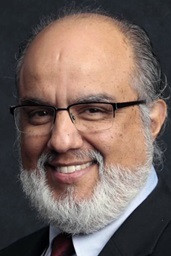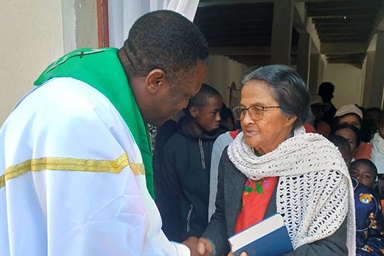Key points:
- The boards of Higher Education and Ministry and Global Ministries are on track to have a single top executive.
- Such a plan raises a lot of questions, says the Rev. William B. Lawrence.
- He argues that what appears to be a move for efficiency may result in diminished effectiveness for the church.

Photo by Todd W. Lawrence.
Commentaries
I once tried to help the chief academic officer of a university appreciate how United Methodist polity functions. I failed. The university needed to understand why a potential faculty member who is an ordained United Methodist minister may need an appointment from a bishop, in addition to an offer from the university, to accept a professorship.
The academic official was befuddled by our system of church order. He interrupted my effort to explain it. “Stop!” he said. “You’re giving me a headache! I’m a Lutheran, and I don’t understand what you’re saying.”
People inside and outside of United Methodist life find it hard to appreciate the intricate balance of power in our constitutionally connected system. Many try to work around it. We can amend our Constitution, but we also look for loopholes in it. We have a legislature to alter our Discipline, but sometimes we just take shortcuts around its laws.
Consider two announcements in October. The general secretary of one denominational agency (the Board of Higher Education and Ministry) will retire in 2024. The general secretary of another agency (the Board of Global Ministries) will succeed him, while retaining his current position and serving both positions simultaneously.
That raises a lot of questions. Is even a superbly talented individual sufficiently gifted to handle two full-time jobs at once? Does our church law allow it? Can the governing board of a United Methodist agency under church law elect as its chief executive officer (i.e., general secretary) someone who is also the elected general secretary of another agency?
According to our United Methodist Book of Discipline, it can.
Paragraph 713 of the Discipline makes clear that the governing board of a general church agency has authority to elect its one and only general secretary. But the Discipline does not block two governing boards from electing the same person to be general secretary at the same time. So, the Global Ministries and Higher Education elections of the same person to be their general secretary are permitted by church law because they are not prohibited by church law.
Yet other legislation applies. Forty pages of church laws cover the responsibilities of the General Board of Global Ministries and the General Board of Higher Education and Ministry.
Subscribe to our
e-newsletter
And another law requires a different entity, the Connectional Table, to “review and evaluate the effectiveness” of boards and agencies “as they collectively seek to aid annual conferences and local churches as they fulfill the mission of The United Methodist Church...” (Paragraph 702.4)
A general board decides who is its only general secretary. But it does not decide if that decision diminishes or fulfills the mission of the church. Others have that task.
When a judgment was made to end United Methodism’s General Commission on Christian Unity and Interreligious Concerns, the General Conference made the decision. United Methodism’s interfaith activities and ecumenical relationships, as well as the theology on which they have been based, were assigned elsewhere by the General Conference. Whether that was wise or not, the commission did not control the decision. Heads ached. But the methods of Methodism mean that no church entity is entirely self-governing.
Does having one person be general secretary of two agencies diminish our church? The answer may be “aye” or “nay.” But it cannot be decided by Higher Ed or Global Ministries. It must come from annual conferences, local churches and other entities. What may look like efficiency to a board may diminish effectiveness for our church. It may quiet the voice of the church in action.
The Discipline gives each general secretary a voice at the Connectional Table. But with one person as general secretary for two bodies, there is one fewer voice at the Table.
From my personal and pastoral experience, I know that general secretaries of general church bodies do not always speak with the same voice. One fewer voice diminishes the church.
To lose the voice of an agency CEO communicating with annual conferences and local churches also diminishes the church. Apportionments support the work of general boards and are paid by annual conferences from funds given by local churches. Of the total amount that a local church pays in apportionments, the General Council on Finance and Administration estimates that between 20% and 25% will fund general church activities, with that number varying from conference to conference. Too few annual conferences and local churches meet directly with a general secretary to discuss Global Ministries matters. With a half-time general secretary, chances for those conversations are cut in half. That diminishes us.
Local church dollars, euros or other currencies also invest in what happens at the Board of Higher Education and Ministry. Missional commitments to education are at stake. Among the first institutions Methodists created were educational — Kingswood School in England and Cokesbury College in North America. For more than two centuries, our institutions in higher education grew nearly to match the numbers of educational institutions founded by other churches. Laity demanded — and funded — graduate theological education for clergy. Laity provided financial aid for graduate education at United Methodist theological schools in various ventures called a Two Percent Fund, the Masters Call and eventually the Ministerial Education Fund, whose destiny is controlled by the Board of Higher Education and Ministry.
In our global work, we have educated generations of leaders for the church and the world.
Our schools, like Lydia Patterson Institute, aided annual conferences and local churches in regional mission. Our colleges, including historically Black colleges and universities, offered higher education to students who otherwise would have lacked any access to undergraduate and professional degrees or were racially segregated from other public and private institutions. Our research universities produced learning in the arts and the sciences to benefit all of humanity.
The rest of us must decide what diminishes us. Mission matters. Sometimes it aches, too.
Lawrence is an ordained elder of The United Methodist Church, former dean of Perkins School of Theology at Southern Methodist University and former president of the Judicial Council.



